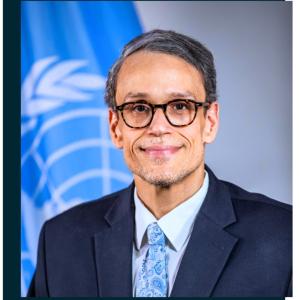It is indeed an honour for me to deliver a closing statement to this timely and important stakeholder conference on the recommendations of the TRRC.
I would like to especially thank the Chairperson of the National Human Rights Commission for inviting me to do so.
Although other commitments prevented me from taking part as much as I would have liked in your deliberations, my UN colleagues tell me that your discussions have been most productive.
Excellencies, ladies and gentlemen,
The Gambia is standing at an important threshold.
The peaceful and credible presidential election in December last year demonstrated without any doubt that The Gambia’s transition is on the right track.
But much work remains to be done, not least addressing the recommendations of the TRRC.
As your discussions over the last 2 days have made clear, a lot is at stake here.
The first step of this journey — beginning to establish the truth — has been carried out in exemplary fashion.
The UN has provided support to the TRRC and NHRC during this transitional justice period. Both the TRRC and NHRC were established through the technical and financial support of the Transitional Justice and Human Rights project funded by UN Peacebuilding in 2017. The project called “Supporting the capacity of the government and national stakeholders to establish credible transitional justice process and mechanisms that promote reconciliation and sustainable peace in The Gambia’ was a joint project implemented by OHCHR and UNDP.
The TRRC has attracted worldwide admiration for the transparent and comprehensive way it carried out its work.
The TRRC has advanced global best practices on transitional justice while doing its work in a way that is best suited to the Gambian context.
The first steps towards addressing the TRRC’s recommendations have also been encouraging.
I would especially like to commend the Minister of Justice for making the full TRRC report available on the Ministry’s website. This is a gesture of transparency that is fully in line with the work of the TRRC itself.
As we all know, the government is preparing a White Paper on how it plans to address the TRRC’s recommendations, something we all await with great interest and anticipation.
The UN will continue to provide support to the process through a second follow up project entitled support to the implementation and monitoring of the Truth, Reconciliation and Reparations Commission (TRRC) recommendations in The Gambia. The project is a PBF funded project. One of the main beneficiaries of the project is the NHRC, a sign of the UN’s commitment to continued support to the Government and the NHRC during the transitional justice period.
The discussions held during this conference will undoubtedly help to guide the government in formulating its response and I would hope that more such consultations will take place between now and the release of the White Paper in May.
The United Nations stands ready to support this.
Excellencies, ladies and gentlemen,
Your discussions over the last two days have ranged broadly over questions of justice, reparations and reconciliation, all with a view to ensuring a comprehensive response to the TRRC’s recommendations, which is essential to preventing such things from every happening again in The Gambia.
You have carefully considered a number of important perspectives on the implementation of the TRRC recommendations, including how to ensure that gender considerations are adequately taken into account, how to monitor implementation, and how to ensure that victims, civil society and the National Human Rights Commission contribute to implementation in mutually reinforcing ways.
In crystalising the findings and recommendations of your discussions into concrete proposals for the government, I would encourage you to continue to work as the TRRC has done — in a manner that is guided by international best practice but that goes beyond this to find solutions that fit the very special Gambian context.
In this way, you will not only be helping the government to formulate its approach to implementing the TRRC’s recommendations, you will also pushing the boundaries of transitional justice and strengthening the foundations upon which human rights in The Gambia can flourish.
Excellencies, ladies and gentlemen,
I have no doubt that, as it did with the work of the TRRC, the world will look in admiration at the way The Gambia will act upon the recommendations of the TRRC.
I commend everyone at this conference — and especially the National Human Rights Commission — for your dedication to ensuring that the momentum created by the TRRC continues, that victims receive the justice and reparations they deserve, and that the nation fully heals from the traumas of its past.
You may continue to count on the UN’s support as you work towards these goals.
Thank you for your attention.




